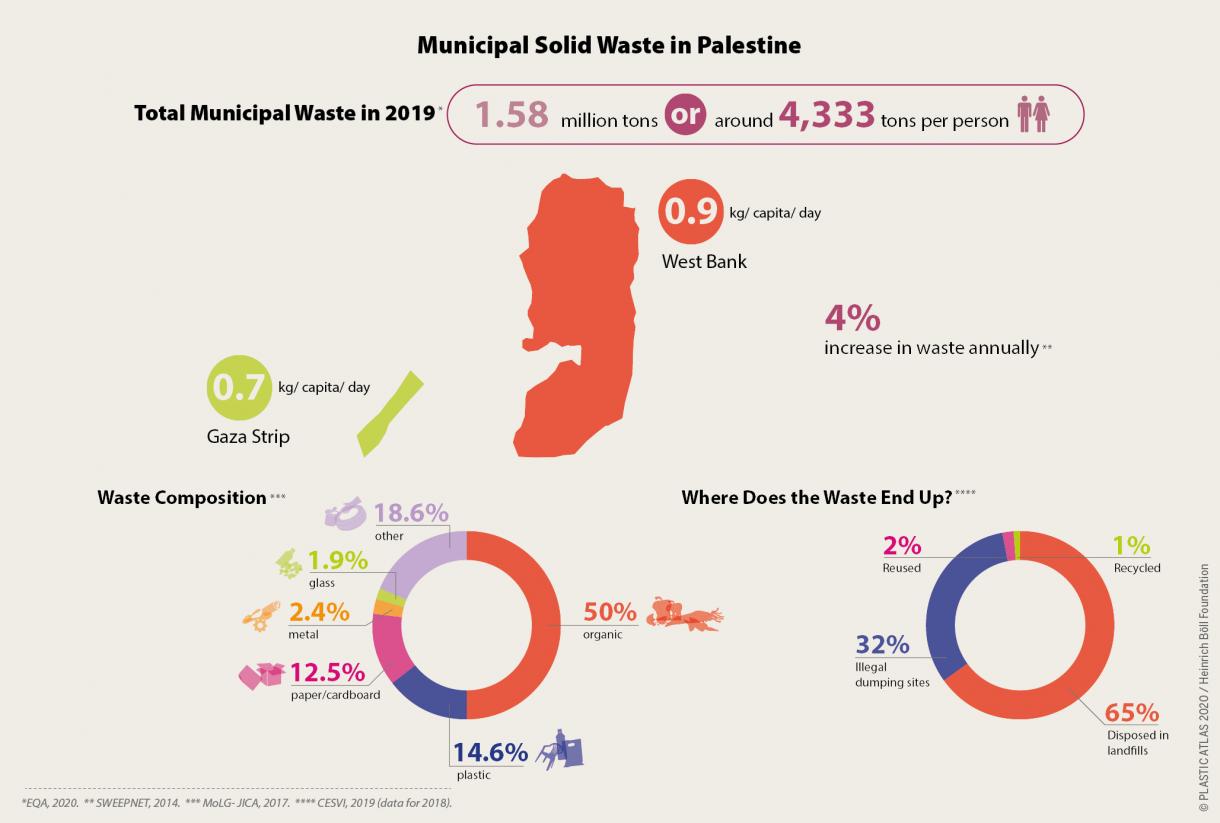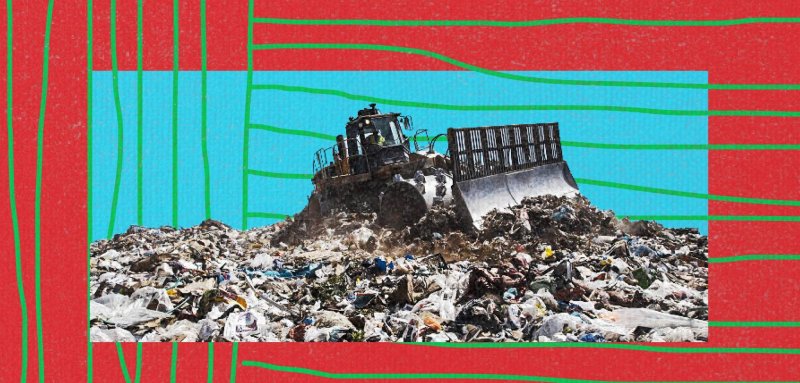The State of Palestine faces multiple environmental challenges, most of them linked to waste management. The United Nations Environment Programme (UNEP) highlighted in 2020 that “47% of all waste, including hazardous waste, is disposed of in unsanitary dump sites”. The figures shared by the Heinrich Böll Foundation in Plastic Atlas focused on municipal solid waste and underlined that 65% of the waste is disposed of in landfills and 32% in illegal dumping sites. Just 3% of the rubbish is recycled or reused.
The sociopolitical and economic context of the country dominated by the occupation makes even bigger the global challenge of waste management in Palestine. The country faces issues with all types of waste: solid, liquid, hazardous, and electronic, calling for integrated and better management among all actors involved.
Waste management issues could pose both environmental risks and impact the health of Palestinians.
The amount of waste produced annually is increasing. For example, municipal solid waste is growing a 4% every year, according to the figures of Plastic Atlas.
In the case of solid waste management, the Italian NGO CESVI underlined that “one of the most important and pressing challenges is the land issue”. The report developed by CESVI explains that following the Oslo Agreements, the Palestinian Authority (PA) administers areas A and to some extent area B in the West Bank. But solid waste management treatment plants are only allowed in area A. In addition, the presence of Israeli settlements further complicates waste management. In Gaza, the situation is more difficult due to the Israeli blockade imposed since 2007, which doesn’t allow the entry of materials and prevents the development of infrastructures in solid waste, water and electrical power.

However, UNEP stressed that “if left unaddressed, waste management issues could pose both environmental risks and seriously impact the health of Palestinians”. But it is already a reality across the country. The young environmental journalists from Gaza Lina al-Bish and Majdi Musleh reported on the effects of illegal landfills (affecting air quality and soil health) and untreated wastewater on the health and livelihoods of citizens. Their reports are framed within the Young Environmental Journalists (YEJ) Training, an initiative of the Environmental Quality Authority (EQA) and the Swedish Environmental Protection Agency (SEPA) under the program Strengthening Palestinian Environment Action Program.
“The wastewater issue in northern Gaza is that the wastewater resulting from more than 400,000 people who live in Beit Lahiya, Jabalia and Beit Hanoun flows to Um al-Nasr (the Bedouin village), where the wastewater is collected in enormous basins and seeps out to the aquifer and soil”, explained Dr. Ahmad Hellas, Head of the National Institute for Environment and Development, in Lina’s report from Gaza.
The State of Palestine faces multiple environmental challenges, most of them linked to waste management. Most of the waste is disposed of in landfills, and just 3% of the rubbish is recycled or reused.
“This situation causes environmental and health disasters that affect all residents, especially immunocompromised and most vulnerable people, such as children, the elderly, and women”, said Hellas.
The inauguration of the North Gaza Emergency Sewage Treatment Plant (NGEST) was a great step to solve the issue of wastewater management in the area, which has been increasing since 2007. However, as highlighted in Lina’s report, the project needs comprehensive follow up, immediate action, and rapid implementation of radical solutions.
Around 40 million cubic meters (m3) of wastewater was discharged by settlements onto Palestinian valleys and agricultural lands annually, accounting for five times more wastewater per capita than Palestinians
In the West Bank, wastewater discharge by Israeli settlements to the Palestinian environment is a growing challenge. According to the 2016 data shared by the Palestinian Environmental NGOs Network- Friends of Earth Palestine (PENGON-FoE Palestine), around 40 million cubic meters (m3) of wastewater was discharged by settlements onto Palestinian valleys and agricultural lands annually, accounting for five times more wastewater per capita than Palestinians. The young environmental journalist Qais Dudin portrayed in his report this situation in Dura, south of Hebron, and how it is affecting especially agricultural lands and soil health.
The lack of management of wastewater leads to health issues linked to the direct contact with polluted water and the contamination of the surrounding environment. This has a direct impact on the citizens’ health. Back in Gaza, the young journalist Yamen Aweidah reviewed in his report different health impacts linked to the lack of access to clean water and sanitation in Gaza, ranging from kidney diseases to skin problems.
However, there are projects and initiatives trying to tackled waste management and environmental issues in the country and the region. The young environmental journalist Mariam Hilme showcased one of those solution stories in Gaza: the recovery of Wadi Gaza. The United Nations Development Project (UNDP) has supporting the restoring of Wadi Gaza Nature Reserve in a three stages project, starting with the put in operation of the Gaza Central Treatment Plant in April 2021.
Waste management needs integrated and planned systems with the contribution of all stakeholders involved, from governments to citizens. The Wadi Gaza story along with other smaller initiatives might show the way for many others to come.
This article is being published under a partnership between Raseef22 and Revolve. The material has been developed under the Young Environmental Journalists Training in Palestine funded by the Swedish Environmental Agency.
Raseef22 is a not for profit entity. Our focus is on quality journalism. Every contribution to the NasRaseef membership goes directly towards journalism production. We stand independent, not accepting corporate sponsorships, sponsored content or political funding.
Support our mission to keep Raseef22 available to all readers by clicking here!
Interested in writing with us? Check our pitch process here!



